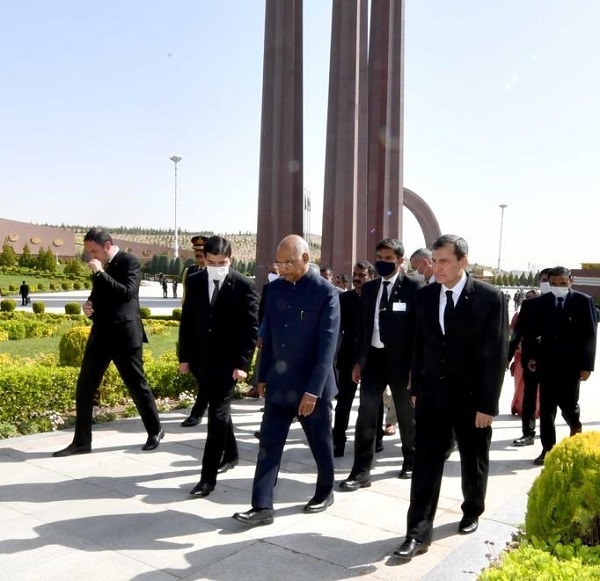
New Delhi, (Asian independent) President Ram Nath Kovind on Sunday said that connectivity with the Central Asian countries remain a key priority for India, which is a member of both the International North-South Transport Corridor, and the Ashgabat Agreement.
Addressing the young diplomats of Turkmenistan at the Institute of International Relations in Ashgabat, he said: “We have taken steps to operationalise the Chabahar port in Iran which can provide a secure, viable and unhindered access to the sea for the Central Asian countries.
“While expanding connectivity, it is important to ensure that connectivity initiatives are consultative, transparent and participatory, with respect for the sovereignty and territorial integrity of all countries. India stands ready to cooperate, invest and build connectivity in the region.”
Kovind stressed that India’s foreign policy has been constantly evolving since its Independence.
“India’s emergence as one of the major economies of the world and the relevance of India’s technological capabilities has shaped key global negotiations. India’s partnerships with countries of the Global South have grown substantially while its relations with major powers have deepened further,” he said.
He emphasised that one of the key pillars of India’s foreign policy in recent years have been the ‘Neighbourhood First’ policy.
“While ‘Indo-Pacific’ is a recent addition to the geopolitical lexicon, India’s engagement with the Indo-Pacific region goes back several centuries. The dynamism and vitality of the region makes it a global economic centre. We stand for an open, balanced, rules-based and stable international trade regime in the Indo-Pacific,” Kovind said.
According to the President, one of the focus areas of Indian foreign policy in the last few years have been the revitalisation of its historical ties with the Central Asian countries, which are a part of our “extended neighbourhood”.
“As developing countries, India and Central Asian countries share common perspectives and similar approaches. We face common challenges such as terrorism, extremism, radicalisation, drug trafficking etc. India has also strategic relations with most of the Central Asian countries,” he said.
On the ongoing conflict in Ukraine, the President said that India’s position on this issue have been steadfast and consistent.
“We have emphasised that the current global order is anchored in international law, the UN Charter, and respect for territorial integrity and sovereignty of states. We are deeply concerned about the worsening humanitarian situation. We have called for immediate cessation of violence and hostilities and return to the path of dialogue and diplomacy. We have also provided humanitarian assistance to Ukraine,” he said.
About how the UN remains the most universal and representative international organisation, he said: “At the core of India’s call for reformed multilateralism lies the reform of the UN Security Council, to reflect the contemporary realities. In this context, India values the support of Turkmenistan for our permanent membership in a reformed and expanded UN Security Council.”
Kovind said that as Turkmenistan marches ahead in the ‘Era of people with Arkadag’, India, as a longstanding friend, stands ready to partner with it to realise the collective dreams of the people. He expressed hope that his visit to Turkmenistan would impart a new momentum to further promote partnership between the two countries.
He also inaugurated an ‘India Corner’ at the Institute of International Relations on the occasion. The ‘India Corner’ is envisioned to create interest in India amongst the students of the Institute in organising India related activities.







